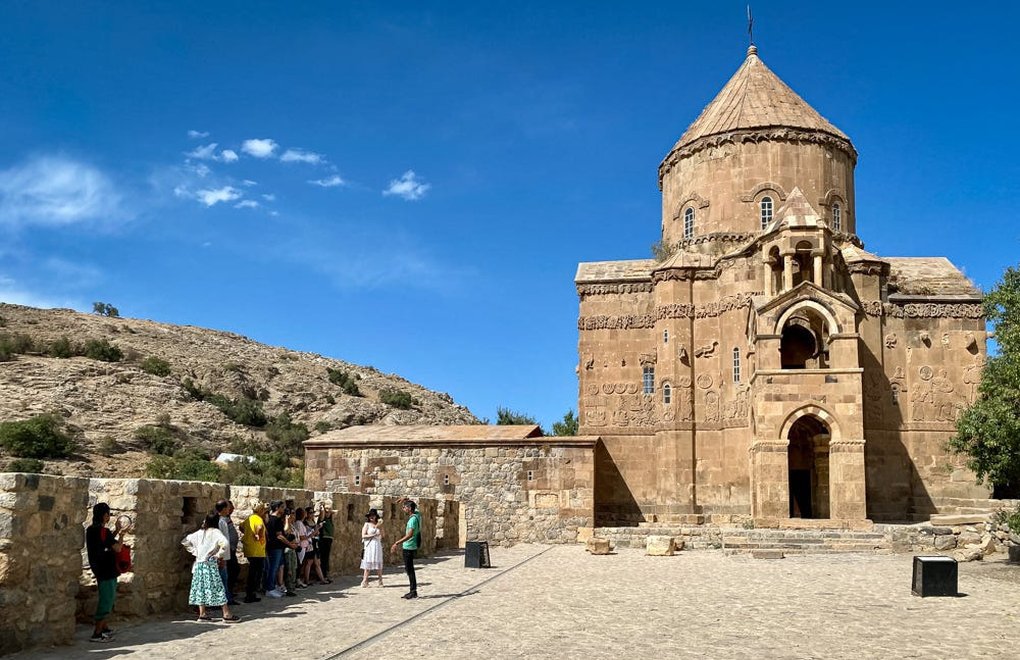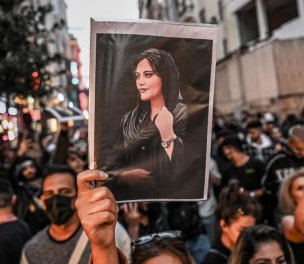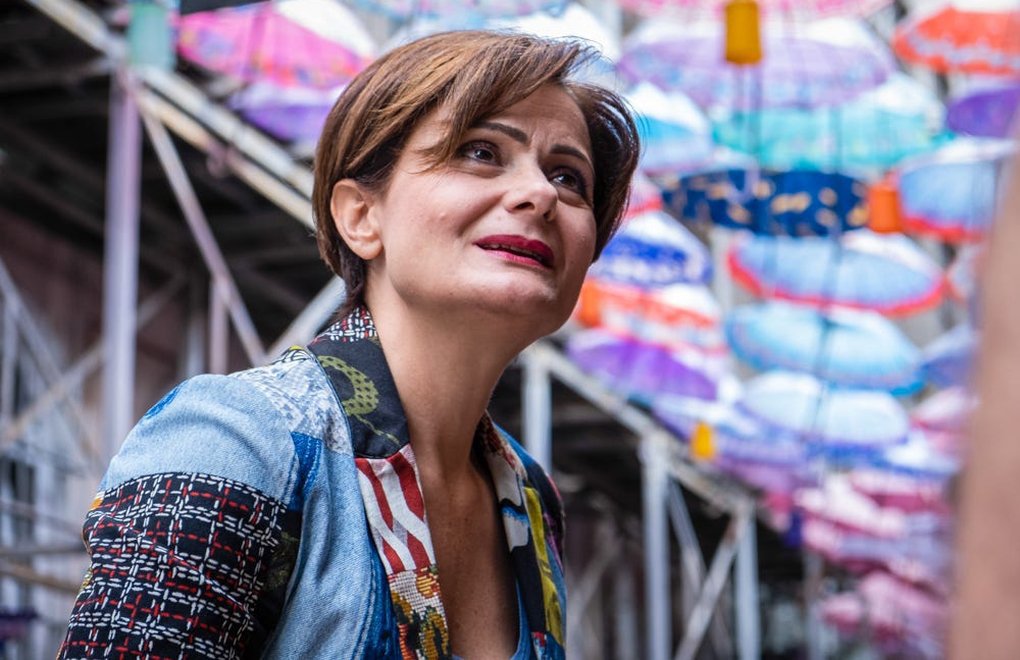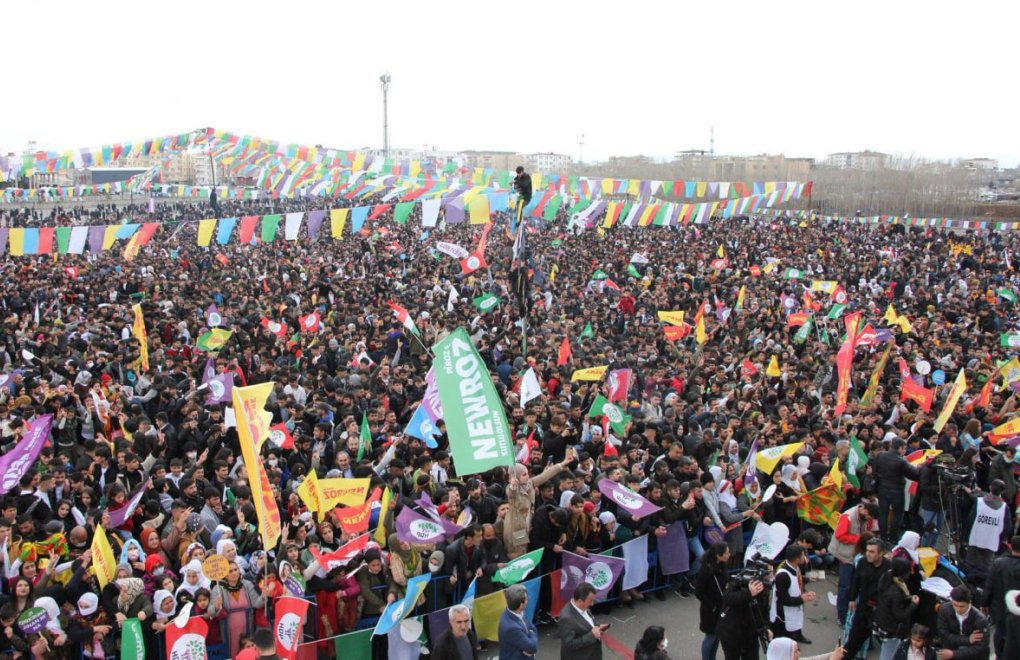Photos: Gonca Tokyol
The historical Armenian church in Akdamar is the main tourist attraction on the island apart from listening to İbrahim Tatlıses and drinking beer on the boat en route. Photos: Gonca Tokyol
Walking in Van, it is almost impossible to pass by a shop without seeing a banner in Farsi. Most offer discounted clothes and cosmetics, some promote daily tours around the city, and others the local cuisine. "Bebakhshid", or "excuse me" in Farsi, is one of the most common words you can hear in the streets after "salam" - or "hello".
Van is mainly known in Türkiye for its fabled lake monster, aka the "Van Gölü Canavarı," and for its place on informal migration routes from eastern countries. But if you take a closer look, it is now one of the rare cities in Türkiye where you can hear the shopkeepers say, "Elhamdülillah, we are doing well," when you ask about business. This is thanks to the Iranians flocking to the city.
Türkiye is often criticized for increasingly curtailing the freedoms of its citizens, especially by the Western world. Yet for tourists coming from Iran, a neighboring country that has been ruled by an Islamic regime since 1979, Türkiye provides many more freedoms than they have back home.
Few places exemplify this contrast more than Türkiye's eastern Van province, which borders Iran, and has drawn a growing number of Iranian tourists looking for respite. In turn, Van's local businesses have been booming despite Türkiye's broader economic downturn.
More than 300,000 tourists visited Van in the first nine months of 2022, according to governor Ozan Balcı, and Van's economy has reached an annual 1.5 billion Turkish liras (more than 80 million USD) as the city's merchants and craftsmen chamber claim.
"The city would have been devastated if we didn't have Iranians," said Ender Kaya, a prominent tradesman in the city. Kaya was a former carpet shop owner who retired after decades of working as a tradesman in the Van bazaar and now only uses his shop in the city center as a man cave to sip tea and chat with old friends.
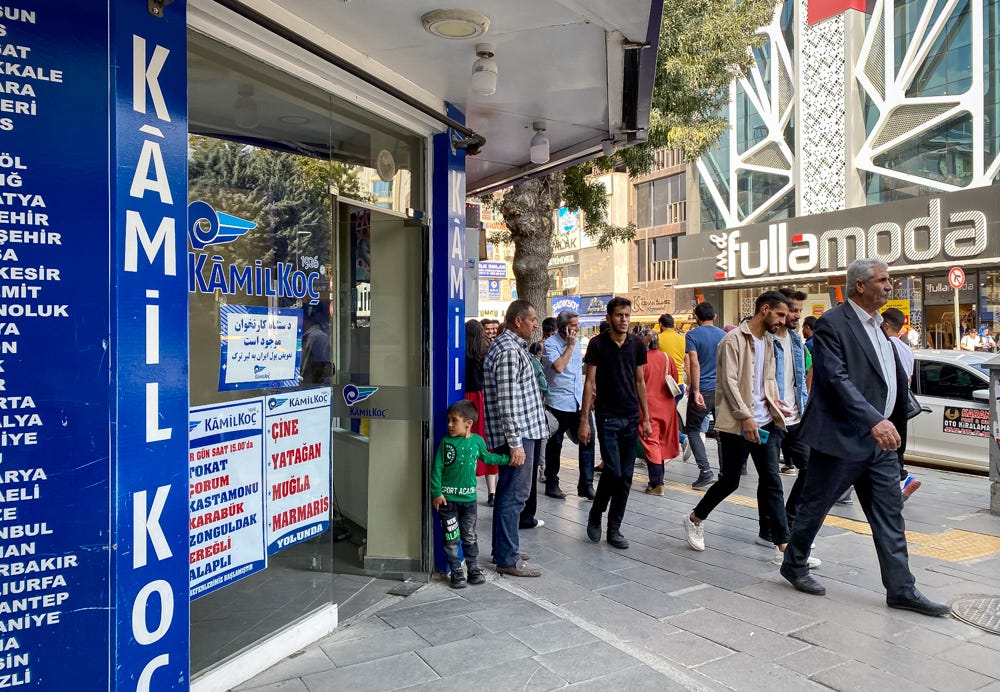 In Van, ads and banners in Farsi are everywhere. The Persian language can be heard more often than Turkish in parts of a city where most citizens speak Kurdish.
In Van, ads and banners in Farsi are everywhere. The Persian language can be heard more often than Turkish in parts of a city where most citizens speak Kurdish.
"The economy of Van had depended on two things, smuggling and animal husbandry," he explained to Turkey recap during one of the tea ceremonies in his shop. "But with increasing pressure from officials, running contraband and illegal cross-border trade became too tricky.
He added, "Growing costs due to the economic crisis made breeding almost impossible. On the other hand, tourism provided people with a new opportunity."
Another shop owner, one of Kaya's friends, interjected, "I visited Gaziantep last week to buy some textiles. The manufacturer told me that he was selling half of his products to Türkiye and half of it to Van. We are lucky that we have Iranians."
According to the board chair of the Van Hotel Owners and Tourism Professionals Association, Yunus Yücel, Iranian tourists not only contribute to people's lives in the tourism sector but also affect the city's economy as they bring vitality.
"They even create opportunities for daily workers," Yücel, also the owner of the Haldi Hotel in the city center, told Turkey recap. "When a receptionist earns more, they go out and spend money, or a business owner invests more on the tourist influx. Iranians are not just good for the hotel owners or the ones who have cafes and restaurants. It contributes to the city's economy altogether."
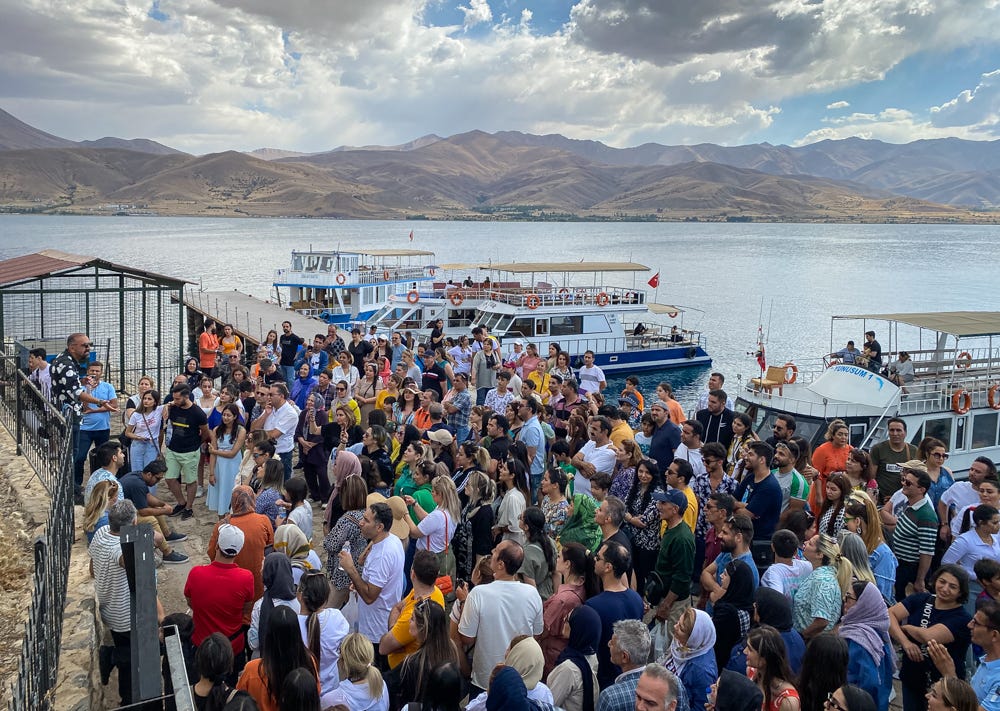 While watching hundreds of Iranian tourists disembarking, one of the Turkish tourists joked: "If we hold a referendum here, the island can become a part of Iran."
While watching hundreds of Iranian tourists disembarking, one of the Turkish tourists joked: "If we hold a referendum here, the island can become a part of Iran."
For the city's secular residents, Iranians' presence has brought not only economic benefits, but also more freedom for Van's women, too.
"Before the tourists, it was impossible to see a woman in shorts in the center," said Tuba Karaağar, a local journalist from the city. "When the Iranians arrived, they came with their colorful outfits, low-cut dresses, and it became normal for others in the city, too."
Though, "not everyone was happy with this change at first," Yücel said. "Conservative people in the town were angry at Iranians. They complained that the tourists perverted our culture. But they saw what happened without tourists during the pandemic. Van was like a ghost town, and a lot of people almost starved during the absence of tourism income. Now, there are no major complaints around."
Iranian tourists mainly come to Van to shop, according to Abdullah Kebiri, a tour operator from Iran. Textiles and cosmetics are very popular, but almost everything on the market can be on a tourist's shopping list.
"The main reason they choose Van is that it is cheap compared to other places," Kebiri said. "With increasing travel costs, it is not easy for them to go to Antalya or İstanbul if they want to visit. But Van is close to Iran. So, the costs are lower. That's why more and more Iranian people choose to come here. It's both a vacation and a shopping opportunity for them."
A three-day vacation from Iran to Van starts from 800 Turkish liras per person – including transportation and hotel – and costs 1,500 liras on average. "They can not even have a holiday in their country with this price. Apart from being cheap, Türkiye also provides freedom to Iranian tourists," Kebiri said.
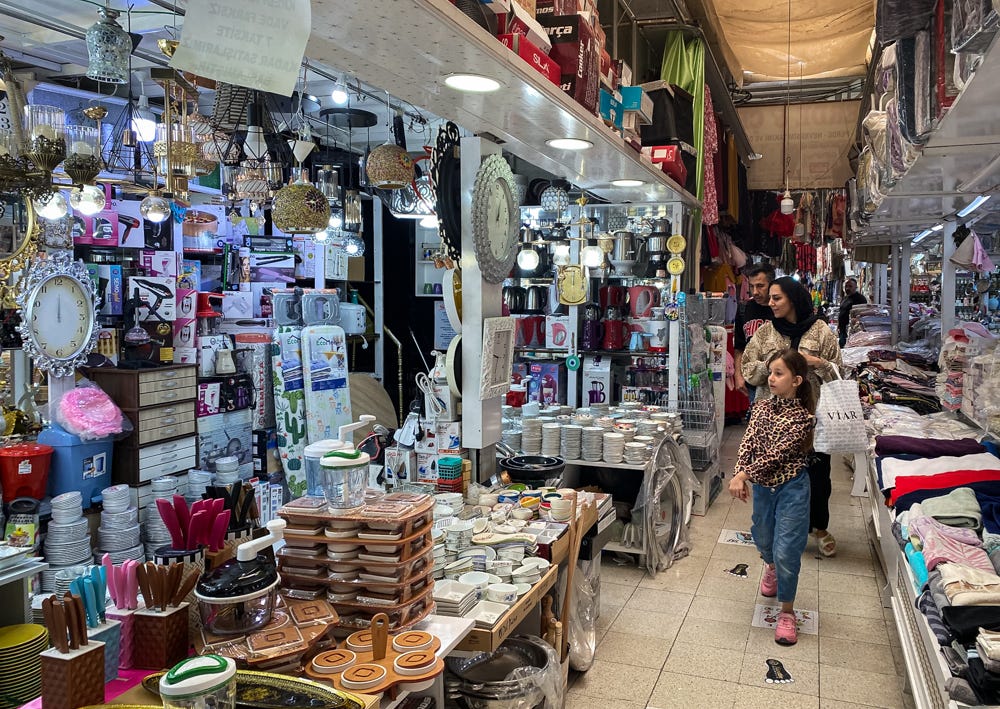 The most common shopping list for Iranian families visiting Van: toys for the children, alcohol for the father, and freedom for the mother. -Check, check, check!
The most common shopping list for Iranian families visiting Van: toys for the children, alcohol for the father, and freedom for the mother. -Check, check, check!
It is easy to notice the freedom that Kebiri mentioned, and the recent protests in Iran show how many Iranians yearn for them. During a tour of Akdamar island, one of the four islands on Lake Van, İbrahim Tatlıses songs came from tour boats carrying Iranian tourists, and litter bins on the road were full of empty beer cans. Everyone seemed to enjoy the ride.
Parisha from Tebriz told Turkey recap the reason she was on holiday in Van was, indeed, to enjoy the freedoms not available in Iran.
"Türkiye is very close to us," she said. "We can have fun here without any restrictions. We love the food and the hospitality of the people here. I can shop and have fun during the night. What more can I want?"
Iranian tourists are mostly absent from the streets during the day if they're not visiting Akdamar or several malls in the city, explained Mahmut, a cafe owner.
"They are getting ready for disco time," Mahmut said. "You'll see how lively the streets become after the dark. It wasn't like that before they came, but now, Van is the nightlife capital of eastern Türkiye."
Akdamar Hotel is one of the oldest tourism establishments in the city, and its disco is very popular among Iranian tourists. Locals are not allowed in, yet, Kourosh Zamani, a journalist from Iran who now works as an organizer for the disco, made an exception for Turkey recap.
"It is probably a little bit different than what you are used to in İstanbul," he said while opening the door, and yes, it was. Discos in Van host hundreds of Iranians, mostly families, every night, and little children sleep on the tables while mothers and fathers dance to Farsi songs.
"I know Türkiye has its own problems, but it's like a paradise for many Iranians," Zamani said during a cigarette break. "I believe many more Iranians will visit Van in the future. Trips to Türkiye are changing their lives, providing them some freedom, and if they're changing Van's fate, helping the people economically, it is a win-win situation." (GT/VK)
This report was produced by Turkey recap with support from the Heinrich Böll Foundation in Türkiye and the IPS Communication Foundation.
Click for all Turkey recap articles on bianet





